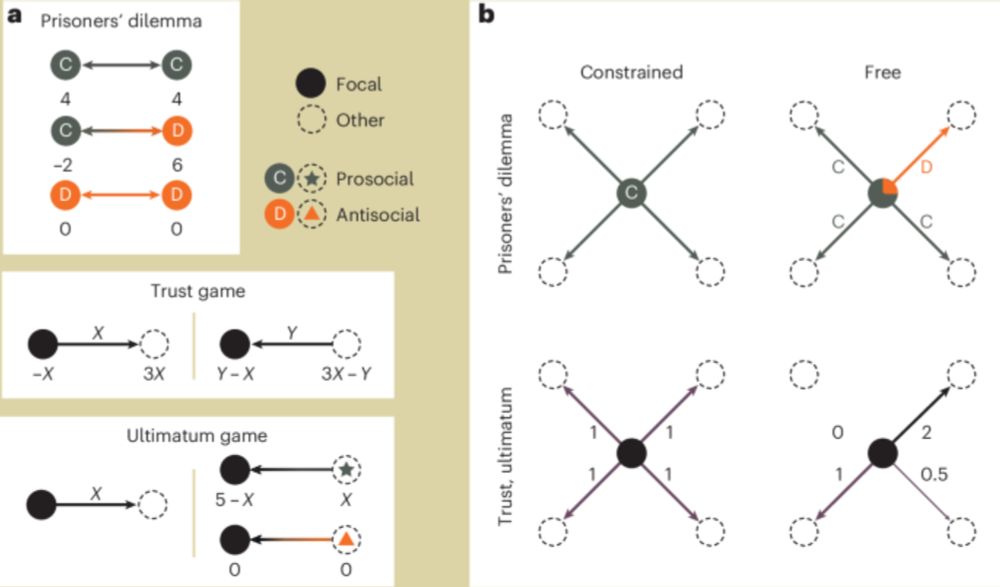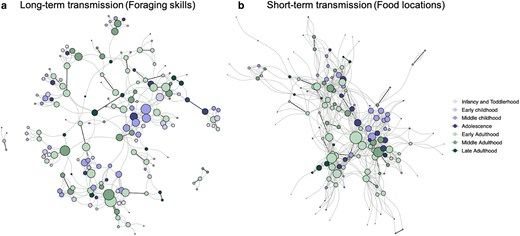ASNA can be confusing—but also full of opportunity. We break down 5 common misunderstandings in animal social network analysis and share solutions from behavioural ecology, anthro, stats, & network science. Hope it helps!
A 🧵
www.ntu.ac.uk/study-and-co...

www.ntu.ac.uk/study-and-co...
learning, and payoff-biased imitation shape group-level accuracy in complex prediction and decision-making tasks in Konstanz
files.newsletter2go.com/l3slzozn/s_i...
learning, and payoff-biased imitation shape group-level accuracy in complex prediction and decision-making tasks in Konstanz
files.newsletter2go.com/l3slzozn/s_i...
A chapter of my dissertation looking at the time dynamics of friendship has been published! We find decreasing emphasis of demographic characteristics over time, in favour of friendships based on interests. Interesting implications on clustering!
www.sciencedirect.com/science/arti...

A chapter of my dissertation looking at the time dynamics of friendship has been published! We find decreasing emphasis of demographic characteristics over time, in favour of friendships based on interests. Interesting implications on clustering!
www.sciencedirect.com/science/arti...

Tom A. B. Snijders, emeritus at Oxford & Groningen, and a key figure in statistical models for networks. A journey from math to sociology, theory to method.
🎧 Listen: open.spotify.com/episode/2mrB...
@aespinosarada.bsky.social @franciscaortizruiz.bsky.social

Tom A. B. Snijders, emeritus at Oxford & Groningen, and a key figure in statistical models for networks. A journey from math to sociology, theory to method.
🎧 Listen: open.spotify.com/episode/2mrB...
@aespinosarada.bsky.social @franciscaortizruiz.bsky.social
"Models casting egalitarian societies as crucibles of equality perpetuate the factually uninformed notion that foragers are somehow more noble. Critiques portray egalitarianism as romantic fantasy. Neither characterization is wholly justified."
doi.org/10.1017/S014...
"Models casting egalitarian societies as crucibles of equality perpetuate the factually uninformed notion that foragers are somehow more noble. Critiques portray egalitarianism as romantic fantasy. Neither characterization is wholly justified."
doi.org/10.1017/S014...
We carried out focus groups and detailed interviews with a whopping 172 women and men about their perceptions of men who support women's empowerment... 📝 1/5

We carried out focus groups and detailed interviews with a whopping 172 women and men about their perceptions of men who support women's empowerment... 📝 1/5
We propose a framework to empirically study animal social relationships by modelling social network (SN) data as time-series—that is, without the need to aggregate them over time.
www.biorxiv.org/content/10.1...

We propose a framework to empirically study animal social relationships by modelling social network (SN) data as time-series—that is, without the need to aggregate them over time.
www.biorxiv.org/content/10.1...

We propose a framework to empirically study animal social relationships by modelling social network (SN) data as time-series—that is, without the need to aggregate them over time.
www.biorxiv.org/content/10.1...

We propose a framework to empirically study animal social relationships by modelling social network (SN) data as time-series—that is, without the need to aggregate them over time.
www.biorxiv.org/content/10.1...
Our reanalyses found *little* evidence that sexual orientation is associated with 2D:4D ratios after accounting for publication bias. 🧵1/7
osf.io/preprints/ps...
Our reanalyses found *little* evidence that sexual orientation is associated with 2D:4D ratios after accounting for publication bias. 🧵1/7
osf.io/preprints/ps...

www.pnas.org/doi/10.1073/...

www.pnas.org/doi/10.1073/...
My (now published) first PhD chapter proposes a Bayesian + causal framework to infer the factors shaping the social relationships that animals form with one another.
journals.plos.org/ploscompbiol...

My (now published) first PhD chapter proposes a Bayesian + causal framework to infer the factors shaping the social relationships that animals form with one another.
journals.plos.org/ploscompbiol...
We ran extensive experiments to show that making the rules of some canonical economic games looser, makes people more cooperative
www.nature.com/articles/s41...

We ran extensive experiments to show that making the rules of some canonical economic games looser, makes people more cooperative
www.nature.com/articles/s41...
www.jobs.ac.uk/job/DOT336/postdoctoral-research-associate

www.jobs.ac.uk/job/DOT336/postdoctoral-research-associate

- 2y research postdoc contract
- Full autonomy, you are your own PI
- Awesome multidisciplinary environment
- All social and behavioral sciences welcome
- Seed funding for projects and workshops
- Gorgeous city in the south of France
www.iast.fr/research-fel...
- 2y research postdoc contract
- Full autonomy, you are your own PI
- Awesome multidisciplinary environment
- All social and behavioral sciences welcome
- Seed funding for projects and workshops
- Gorgeous city in the south of France
www.iast.fr/research-fel...

🔍 Our study checked data/code-sharing policies in 275 eco/evo journals and compliance in Proc B (n=2,340) & Ecology Letters (n=571). Policies exist, but clarity and strictness vary, affecting reproducibility.
🔗 doi.org/10.1098/rspb...

🔍 Our study checked data/code-sharing policies in 275 eco/evo journals and compliance in Proc B (n=2,340) & Ecology Letters (n=571). Policies exist, but clarity and strictness vary, affecting reproducibility.
🔗 doi.org/10.1098/rspb...

How is knowledge transmitted across generations in a foraging society?
With @danielredhead.bsky.social
we found: In BaYaka foragers, long-term skills pass in smaller, sparser networks, while short-term food info circulates broadly & reciprocally
academic.oup.com/pnasnexus/ar...

How is knowledge transmitted across generations in a foraging society?
With @danielredhead.bsky.social
we found: In BaYaka foragers, long-term skills pass in smaller, sparser networks, while short-term food info circulates broadly & reciprocally
academic.oup.com/pnasnexus/ar...
A thread summarising a part of our new paper (ecoevorxiv.org/repository/v...).


